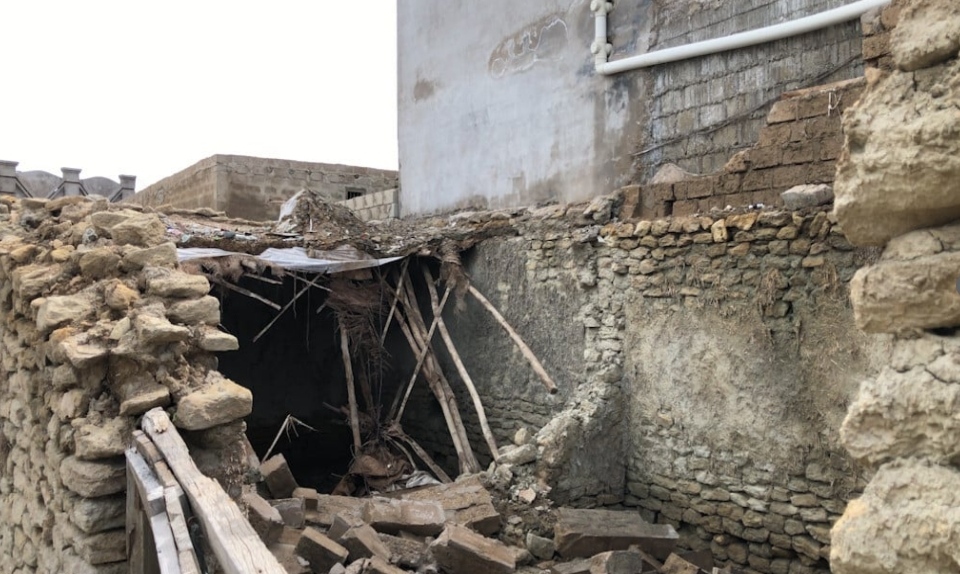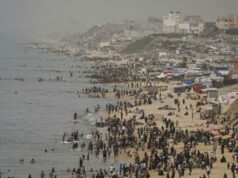Gwadar drowns in negligence
By Mohammad Zafar Baloch
Recent floods and lack of government response have washed away Gwadar’s image as the crown jewel of CPEC

The port city of Gwadar in Balochistan has been Noreen’s home for the last six years. It has so far been a dwelling of misery for her. She has not paid her rent for three months now and faces threats of eviction from the landlord. “Feeding the children has become the biggest challenge, the business of sea is also closed, and there is no other way of winning bread for the family,” lamented Noreen.
Remaining Time -9:47
To top all this, the recent rains and urban flooding hit Gwadar, and her life, which was already full of worries, became more difficult. With the sea being closed for business the fishing community has been hit badly.
Massi Begum, an aged resident of Gwadar who is also a councillor and has been severely affected by the recent devastation. “I belong to a fishermen family,” she said, “My children are Janshu [boat worker in Balochi]. Nobody helped us. There is only misery and disaster all around.”
Massi Begum demanded that the provincial government help the people in need.
Only a few months earlier, world leaders had gathered in UAE for the Conference of Parties (COP28). Photos were clicked, pledges were made, and many decisions were undertaken, including the transition from fossil fuels. Far away and far from having a say in all that, the people of Balochistan are among the worst affected by climate change. In the flash floods of 2022, the entire province presented a spectacle of a devastated war-ravaged area.
Two years on the government has not been successful in rehabilitating the effects of the floods, and yet another crisis has hit the coast of Balochistan. This time the disaster happened in Gwadar, touted as the crown jewel of the China Pakistan Economic Corridor CPEC. Houses drowned, roads were broken, the infrastructure ravaged and people went hungry. Gwadar is not an image of the future at all.
Suffering the impact of the climate crisis created by the heavy industries of the First World, the local people in Gwadar have lost much in the recent devastation. When there were ongoing negotiations in the power corridors about the distribution of ministries and the re-shuffling of bureaucracy in Balochistan, the urban flooding in Gwadar stood as a stark image to what the mainstream media generally shows with views of the marine drive.
Shahid, a fisherman, expressed helplessness in the face of disaster. “My home is filled with water, my furniture is destroyed, and the walls of my house are full of cracks, I await help,” he said. He said that neither does he own a generator, nor is he getting any help from the government to pump the floodwater out of his home. His misery doesn’t end here. As a fisherman, he does not have any alternative to earn bread and butter for his family when the sea is closed.
It is not that nobody knows about climate change in Balochistan. Mirza Ghalib, a resident of Gwadar, who studies at FC College Lahore, was home when the recent rains hit. His take on the issues is informed, he said “We are at the frontline of climate change. It has not been so long since the floods wreaked havoc across Balochistan, and the current climate crisis is not natural but a result of human stupidity and negligence.”
Highlighting the climate effects all over the world, he mentioned that the world is responding to this issue with adaptive infrastructure, whereas billions were spent here in the name of development and infrastructure building but ambiguous developmental schemes became quite evident when rain washed away the city. Mirza believes that this issue is political and the response should in turn be to politicise the climate crisis. Also mentioning that there are currently two cities within Gwadar, one belongs to the powerful and the wealthy, and the other to the deprived and the poor.
The Baloch Yakjetii Committee (BYC) which gained prominence in recent times after the Balaach Mola Baksh case and the Long March to Islamabad has also been seen as quite active in this scenario. Their prominent leader, Dr Mahrag Baloch reached Gwadar and met the people, and also organised a public session on the indigenous perspective around it. The BYC activists were seen active, collecting data and establishing relief and donation camps for the people of Gwadar in multiple cities. According their webpage, the camp that they established in Gwadar was not granted an NOC by the Deputy Commissioner of Gwadar and was later torn apart, creating discontent among the public of Balochistan and outrage on social media.
Shaheena Rashid, a student activist who has been surveying the old city areas and collecting data about the devastation with her team. She said that there are many places where they cannot go yet. She said, “As per the data which we collected of certain areas, there are more than 200 homes which are in immediate need, there are females who are ba-parda.”
Sameer Baloch, a resident of Gwadar and also a student activist also directed towards the climate crisis being a political issue, facing the whole world. Sameer mentioned that the federal and provincial authorities make tall claims about the development in Gwadar but the reality is the opposite. He stressed that “The only development which has been done is Marine Drive and the cricket stadium, whereas the failed infrastructure of the Gwadar old city is the reason behind the recent rains descending devastation”. Sameer believes that the Government has a lot of work that needs to be done.
The people are angry with the administration and provincial government. They believe that the funds and all the development that is taking place in ambiguous and are not benefitting the people. Angry Hassan from Gwadar said, “I don’t know anything about any funds if they were sent from somewhere, they didn’t reach us, we are badly affected, if the rain comes again, nothing would be left.”
In the first speech, the Chief Minister of Balochistan highlighted that one of the major threats to Balochistan is Climate Change. He also mentioned that it is a crisis in which Balochistan’s contribution is none. He pledged that it would be among the top priorities of his administration.
Mohammad Younus Mengal, an Assistant Relief officer and Incharge of the Provincial Emergency Operation Center, Provincial Disaster Management Authority (PDMA) has said that “kaccha houses” (Mud Houses) are always among the worst affected whenever a disaster hits because of weak drainage system. He further mentioned that” It was observed during the recent urban-flooding in Gwadar that the newly constructed planned houses were saved because of a better drainage system and the old populations suffered because of low lying areas and poor drainage system. However, after continuous hard work, the teams working there managed the dewatering.”
Mr. Mengal said that the Government of Balochistan is trying to plan a better mechanism to protect the low-lying areas from future disasters through a properly planned drainage system.
In response to a question about the effects of climate change and the long-term plans of the provincial government, he said “There is no doubt that the region is facing a climate crisis and Balochistan has been hit much recently, but the provincial and federal governments are working on minimising its impacts, and plan a well manner mechanism to mitigate the adverse impacts of climate change in future”.
The recent urban flooding in Gwadar has washed away the perception of Gwadar being the crown Jewel of CPEC. At a time when the Pakistani Government is claiming that the CPEC has entered its second phase, the people of Gwadar are alienated from the ambiguous developments.
However, Sarfaraz is the first CM who has at least used the term climate change in the assembly. That is hard to decide whether it is out of serious concern or because of trendy appearances. The people of Balochistan undoubtedly are at the frontline of multiple disasters, whether it be climate change or other longstanding political crises.



